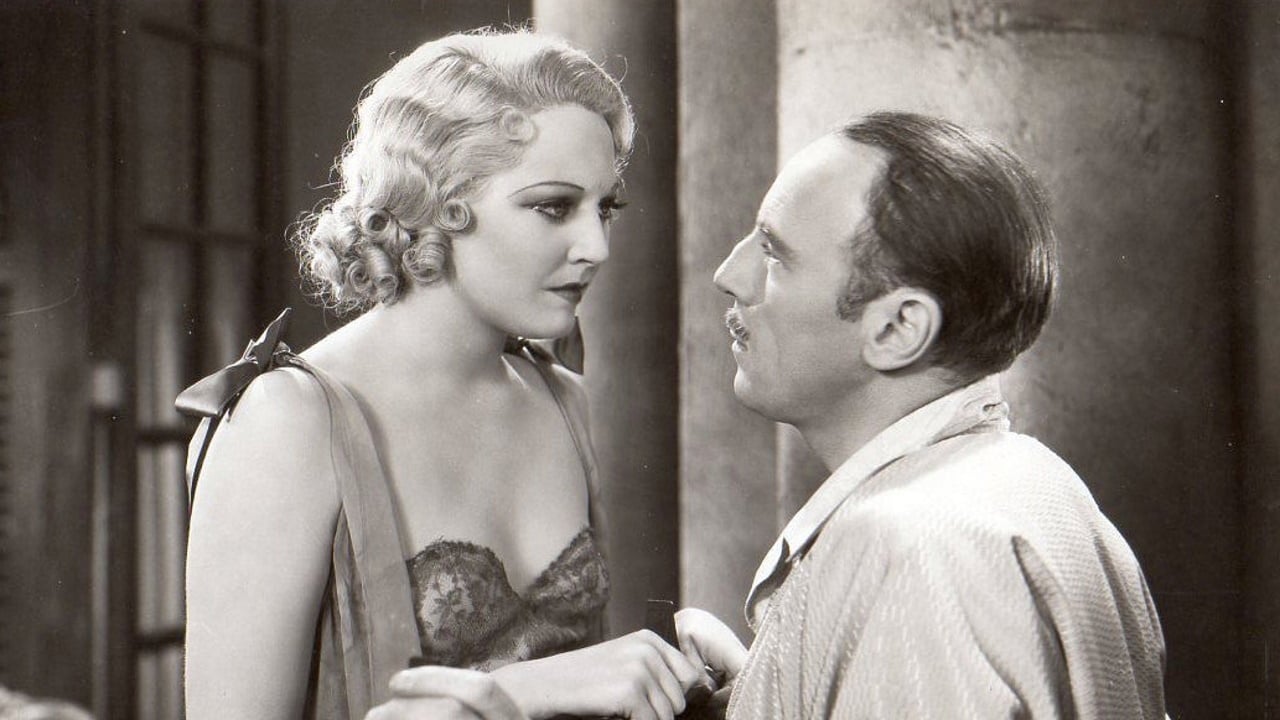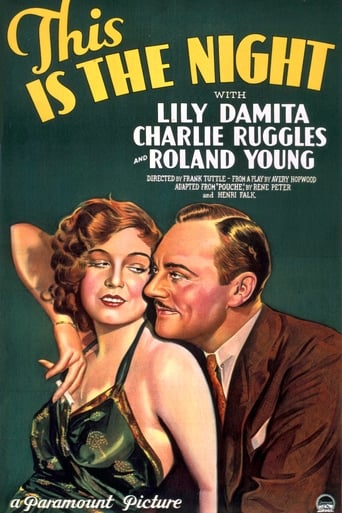

This poor excuse for a movie should never have been made. Cary Grant trying to sing as though he's in an opera just doesn't work. His accent sounds a bit old fashioned Cockney in this film, and his character is unnatural. There are some scenes that border on nudity, but they don't add to the film. If anything it looks like a poor attempt to rescue the film. It is beyond redemption, and comes nowhere near the quality of 'My Favourite Wife'. Roland Young is not convincing as a lover or a man with a hot French wife. He usually plays the inebriated old man in films, but he is neither funny nor engaging. For this reason it is not a movie. I don't know what it is. It just adds another credit to Grant's film list.
... View MoreCary Grant's film debut (which I now watched on the 110th anniversary of his birth) is hardly ever discussed but, recently, a fellow American movie-buff friend of mine rated it a startling ***1/2 (for the record, Leonard Maltin accords it a more modest **1/2 in his guide) and I also found it listed in the "Wonders In The Dark" website's poll of the "All- Time Top 3000 Movies"!A very typical "frothy" Paramount effort from this era, and one that obviously apes the famed Lubitsch touch then in full force (even going so far as to borrow two of his alumni for the male leads, namely Charlie Ruggles and Roland Young). Grant is a singing javelin-thrower(!) married to Thelma Todd (who is constantly getting her clothes caught in doors and torn clean off her!); the latter has a fling with bachelor Young (this emanates from an era where the audience did not question the considerable age difference in a relationship – but, then, an older Grant would often be guilty of that as well!) and, when caught by Grant, pal Ruggles invents a wife for Young which Grant then asks to meet! They all end up on vacation in Venice (also partly the setting of Lubitsch's masterpiece TROUBLE IN PARADISE, made the same year and also featuring Ruggles!) with down-on-her-luck actress Lily Damita filling the part of devoted spouse to Young.While the woman's supposed charms did not brush off on me (this is the first I have ever seen of her), the same cannot be said of her co-stars, all of whom vie for her attentions at some point or another – or, for that matter, the likes of Michael Curtiz and Errol Flynn who would make her their wife in real life (though both marriages ended in divorce)! Anyway, while the film definitely has a style and sophistication to it (not entirely typical of director Tuttle, whose forte would eventually be hard-boiled thrillers), the intermittent songs – another shameless borrowing from Lubitsch (not to mention Rene' Clair) – do come off as forced and a regrettable intrusion! The situations, while hardly inspired, are mostly engaging and the whole offers an entertaining ride despite finding all concerned not quite in their best form. Here, too, the use (or, should I say, misuse) of Italian comes into play – especially when Ruggles tries to leave Damita's room via a ladder on the point of being removed by a couple of local policemen and, consequently, falls into the canal below and is taken by the representatives of the law for a burglar, Grant, however, intercedes and, when he tells them Ruggles is actually the lady's lover, the two "guardie" burst into a litany of pardons (love, apparently, does conquer all) – which causes Ruggles to subsequently dub them "the 'Scusi' brothers"!
... View MoreThis is a Pre-Code sex comedy that is very good--but in hindsight, the casting was insane. If I explain the basic plot, you will understand. Beautiful Thelma Todd plays a bored wife who wants to have an affair. So, she picks out Roland Young--a very mousy man with absolutely nothing to offer her. And who is the husband of this lady? Yup, it's played by Cary Grant!! And, Grant plays an Olympic javelin thrower. Yet, oddly, she makes the moves on Young--who has the sex appeal of Edward Everett Horton! So, if you can ignore the dumb casting is the film worth seeing? Absolutely--it's a great farce with a really well-written plot. What happens is that Grant catches his wife with the other man. And, trying to help, Young's friend (Charlie Ruggles) tells Grant that Young is already very happily married--and makes up a story about a fictional wife. So, Grant asks Young to bring his wife with him on a trip--so they can all become good friends. So, Young scrambles to find a woman willing to pretend to be his wife and finds down in your luck Lili Damita (one of Errol Flynn's wives in real life). He thinks she's a prostitute, so he has no problem offering her money. But, she is a nice girl--and one that Young finds himself increasingly attracted to through the course of their trip to romantic Venice.The casting can be blamed on the producer. But even a dumb producer can be overcome by a witty script--and this one is witty and filled with excellent dialog. In addition, it's a chance to see Grant in his debut film. Now that I think about it, if Grant and Young had switched roles, this would have been an even better movie.
... View MoreFrank Tuttle was a highly competent house director for many years, working for Sam Goldwyn, Paramount and so forth, turning out well-made movies in which the style served the story. In our day of auteur worship and the insistence that, if a critic can't tell who directed a film without looking at the credits, it is not a good film, craftsmen like Tuttle are considered hacks. I disagree. You may disagree with me. We'll leave that unsettled for the moment and thumb wrestle over it later.This movie has all the earmarks of a Lubitsch picture: the European settings (Paris, Hollywood, which Lubitsch said he much preferred to Paris France; Venice, where he had set the opening of TROUBLE IN PARADISE two years earlier) and is the sort of racy European comedy that Paramount specialized in until the Production Code killed them dead later that year. The setups are all Lubitsch: the recitative number "Madame Has Lost Her Dress" that opens the movie; The sexual imagery of Cary Grant carrying around a bagful of javelins and reducing Roland Young and Charlie Ruggles to blithering idiocy; Thelma Todd in her underwear; and into this mess lands Lily Damita, an honest girl reduced to sleeping on movie sets: trouble in Paris, Hollywood.Although Tuttle lacks the ability to direct actors in the small, exquisite details that Lubitsch did, he had a fine hand at framing and storyline. The movie is near perfect, except for the miscasting of Roland Young as the love interest..... but perhaps that is the point of the matter: we do not always fall in love with Maurice Chevalier.
... View More